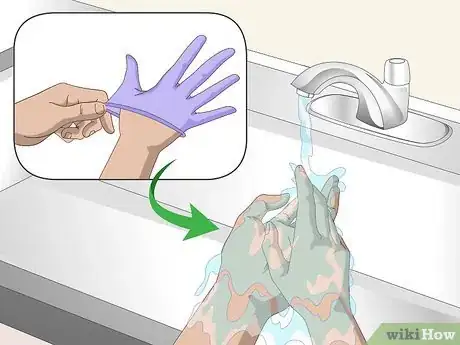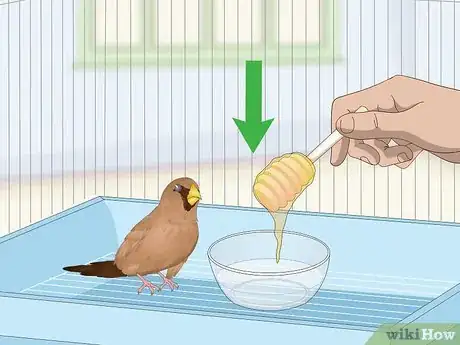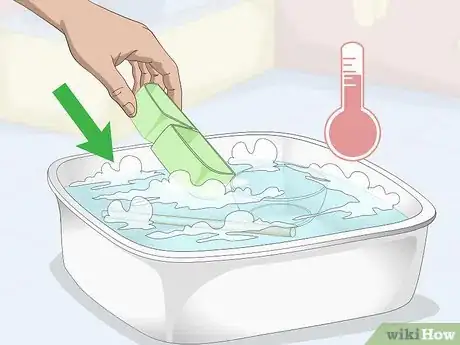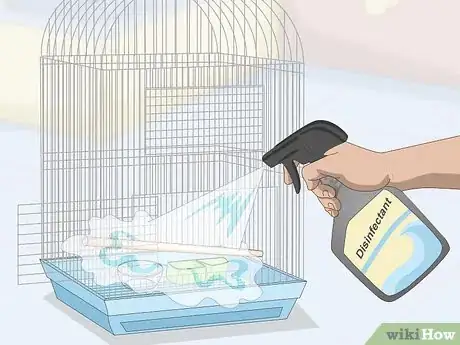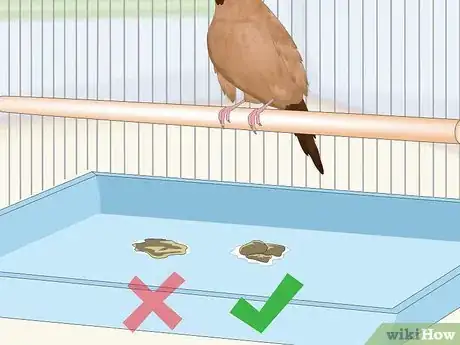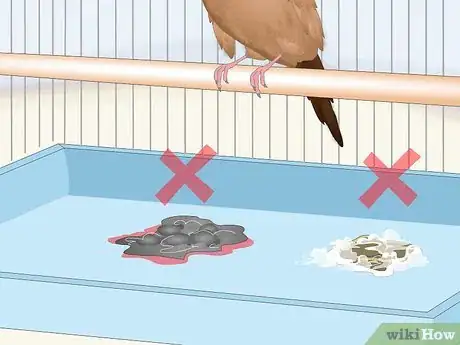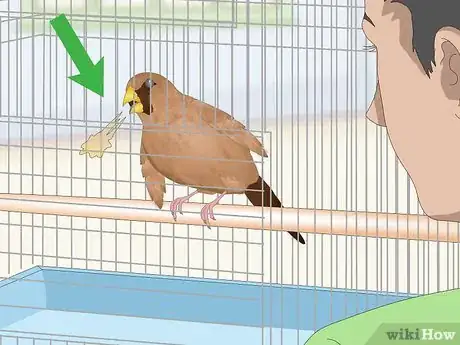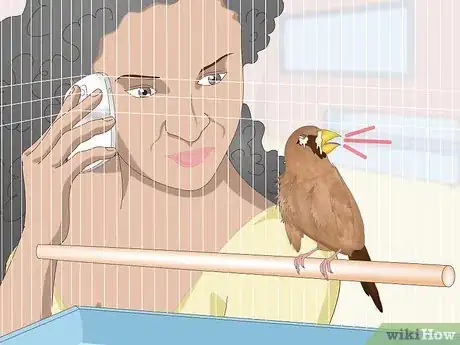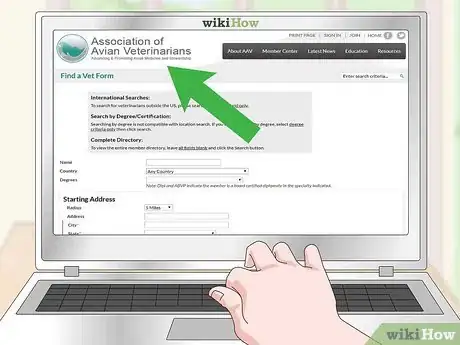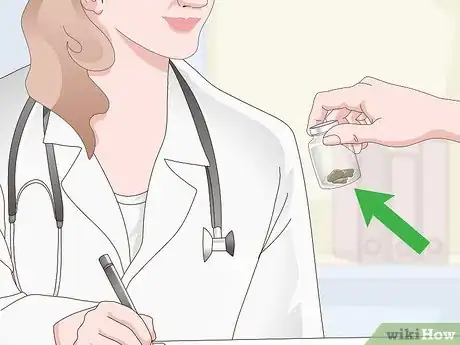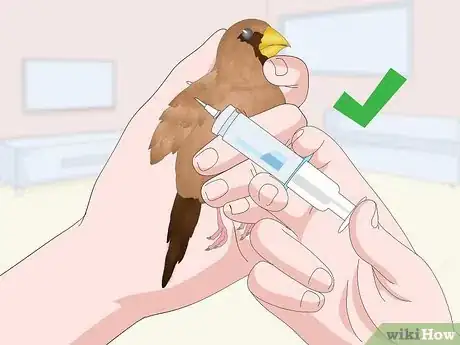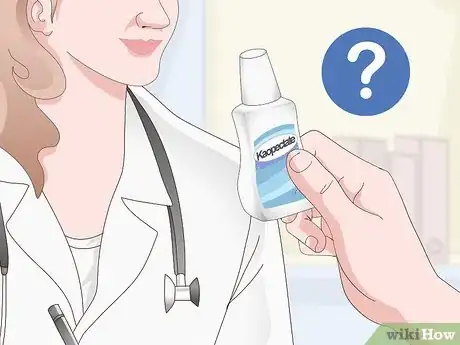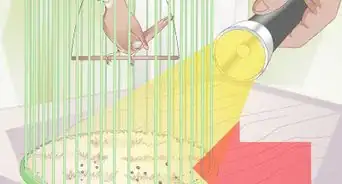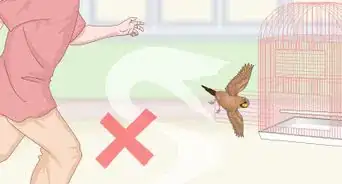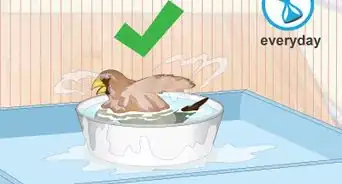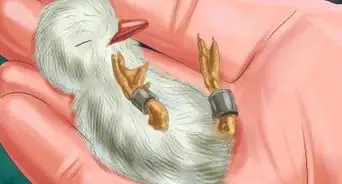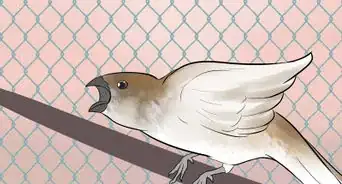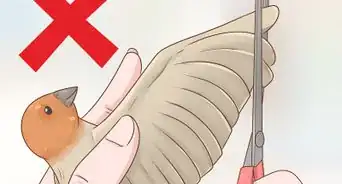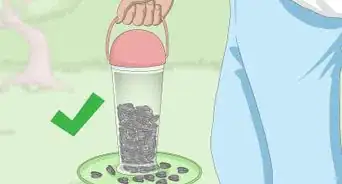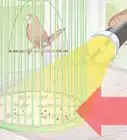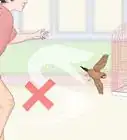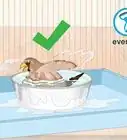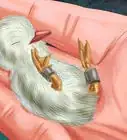This article was co-authored by Deanne Pawlisch, CVT, MA. Deanne Pawlisch is a Certified Veterinary Technician, who does corporate training for veterinary practices and has taught at the NAVTA-approved Veterinary Assistant Program at the Harper College in Illinois and in 2011 was elected to the board of the Veterinary Emergency and Critical Care Foundation. Deanne has been a Board Member of the Veterinary Emergency and Critical Care Foundation in San Antonio, Texas since 2011. She holds a BS in Anthropology from Loyola University and an MA in Anthropology from Northern Illinois University.
There are 8 references cited in this article, which can be found at the bottom of the page.
This article has been viewed 21,762 times.
If your finch experiences diarrhea or any other symptoms of illness, acting quickly can help increase its recovery chances. Isolate the sick finch from your other birds as soon as possible, then disinfect the main cage to help reduce the risk of an outbreak. Look for other symptoms, and call the vet if problems persist for more than eight hours. If diarrhea occurs just once or twice, it’s probably little cause for concern. However, prolonged or severe symptoms could indicate an infection or other medical issue.
Steps
Quarantining the Sick Finch
-
1Wear disposable gloves and wash your hands frequently. Wear gloves whenever you clean the cage, come into contact with droppings, or handle food and water bowls. Wash your hands well after performing cage maintenance or handling your birds.[1]
- While you should always use proper hand hygiene, wearing gloves and washing your hands is especially important if one of your birds is sick. If your sick finch has a communicable disease, hand hygiene will help you prevent it from spreading.
-
2Transfer the sick bird to a quarantine cage immediately. Isolate the sick finch as soon as you notice something’s wrong. Keep it in a smaller cage with a towel draped over one half and a heat lamp propped over the other. Make sure it has food and water at all times, but change and clean the bowls frequently.
- The heat lamp should be labeled for small animals and shouldn’t generate any light. Constant light could prevent the sick bird from getting enough rest.[2]
Advertisement -
3Try to keep the bird hydrated. Provide fresh, clean water at all times, and try to notice if your finch is drinking. If necessary, add honey to the water to encourage drinking or replace the water with Pedialyte. You’ll need to clean and change sweetened water more often to prevent bacterial growth.[3]
- If the bird is too weak to drink on its own, take it to the vet immediately.
Disinfecting the Main Cage
-
1Soak perches and bowls in hot, soapy water. If you have other finches, secure them wherever you keep them during routine cage maintenance. Remove all perches, bowls, toys and other items from the cage. Soak them in a bucket filled with hot water and a teaspoon of antibacterial dish soap. You can also use equal parts hot water and white vinegar. Scrub and rinse the items thoroughly and then let them air dry.
- Any buckets, sponges, soap bottles, and other cleaning supplies used for cage cleaning should not be used for any other purpose.
- Do not wash the cage, perches, bowls, or any other items in a kitchen or bathroom sink, especially if you have a sick bird. It’s best to take them outside to wash them.
- Make sure to wear disposable gloves during cage maintenance. Wash your hands well when you’re finished.
-
2Clean the main cage with antibacterial soap. Remove and discard the liner at the bottom of the cage. Use a sponge, hot water, and antibacterial dish soap to clean all surfaces and between the bars, and make sure to scrub away any stubborn deposits. Rinse away suds, then dry the cage well with clean paper towels.[4]
- Disinfectant products won’t work properly if you leave behind any organic matter, so make sure to scrub away caked on seeds, droppings, and other residue.[5]
- Instead of antibacterial soap, you can use equal parts hot water and white vinegar to clean the cage.
-
3Disinfect and thoroughly rinse the cage, perches, and bowls. Spray the cage, perches, bowls, and other items with a store-bought cage disinfectant or a bird-safe cleaner. Thoroughly cover all surfaces with the disinfectant and work it between the cage’s bars and into the corners. Allow the disinfectant to sit for five to ten minutes, then rinse it away with hot water.[6]
- You can also disinfect the items with boiling water.
Monitoring Your Finch
-
1Distinguish between true diarrhea and watery droppings. In addition to feces, bird droppings consist of urine, or the clear liquid portion, and urates, or the white portion. Excess urine and urates can cause watery droppings that can easily be confused with diarrhea. In true cases of diarrhea, the feces are unformed and loose.[7]
- In finches, normal feces are solid and tube-shaped or coiled.
- Excess urine is often due to eating more fruits and vegetables or drinking more, so keep track of any recent dietary changes.
-
2Look for color changes, bubbles, or odor. Any color changes that accompany loose feces can help you identify a potential cause. Red or black feces can indicate internal bleeding, and yellow could be a sign of liver problems or infection. Bubbles or foam are also signs that your finch might have an infection.
- In addition, foul-smelling diarrhea is a sign of infection.
-
3Note any related symptoms. Your bird is likely sick and will need to see a vet if it exhibits unusual symptoms in addition to diarrhea, or if diarrhea continues for longer than 24 hours. Other symptoms might include:
- Lethargy or weakness
- Vomiting
- Difficulty breathing
- Coughing, sneezing, or nasal discharges
- Fluffed or matted feathers
- Lesions or pox on non-feathered body parts
-
4Get help if symptoms persist or are severe. If diarrhea occurs once or twice, it might just be a sign of stress and go away on its own. Call the vet if it or any other symptoms persist for more than eight hours.[8]
- Get help immediately if your finch has difficulty breathing or if you observe blood or any deformities at the vent (where it releases droppings).
Consulting an Avian Vet
-
1Find a local avian veterinarian. If you don’t already have a vet for your finches, find one in your area who has experience treating birds. Try searching online for “avian vet” near your location. You can also use the search tool on the website of the Association of Avian Veterinarians.[9]
-
2Have tests taken to make an accurate diagnosis. In order to identify a specific cause, the vet will need to do tests on a stool sample. They might also need to run other tests, such as blood tests.
- A variety of viruses, bacteria, fungi, and parasites can cause diarrhea, and each requires a different treatment method.
-
3Administer medications according to the vet’s instructions. Depending on the type of pathogen the vet discovers, they’ll prescribe an antibiotic or antifungal medication. They’ll either inject the drug or instruct you how to mix it into your bird’s food. Always administer any medication according to the vet’s instructions and for as long as they direct.[10]
- You should also ask the vet if your other birds need any medication to prevent infection.
-
4Ask the vet if they recommend an antacid. The vet might also recommend diarrhea medications such as Kaopectate or Pepto Bismol. Use a dropper feeder to administer two to three drops per day, or according to the vet’s instructions.
References
- ↑ https://www.cdc.gov/healthypets/pets/birds.html
- ↑ http://www.finchaviary.com/Maintenance/DealingWithIllness.htm
- ↑ https://www.beautyofbirds.com/sickbirdcare.html
- ↑ https://www.cdc.gov/healthypets/pets/birds.html
- ↑ http://www.peteducation.com/article.cfm?c=15+1794&aid=2837
- ↑ https://www.cdc.gov/healthypets/pets/birds.html
- ↑ http://www.wingwise.com/droppings.htm
- ↑ http://www.peteducation.com/article.cfm?c=15+1912&aid=2902
- ↑ https://www.aav.org/search/custom.asp?id=1803
About This Article
If your finch has diarrhea, provide it with clean water at all times to keep it hydrated. If you notice that it’s not drinking, you can add a little honey to the water to encourage it to drink. You should also disinfect the entire cage and change the floor lining to get rid of any germs. Make sure to quarantine your sick finch, if you have more than one bird in the same cage, to stop its illness from spreading to the other birds. If its diarrhea continues for longer than 24 hours or it shows other symptoms like vomiting, difficulty breathing, lethargy, coughing, or sneezing, you should take it to a vet for a diagnosis. For more tips from our Veterinary co-author, including how to locate an avian vet in your area, read on!
